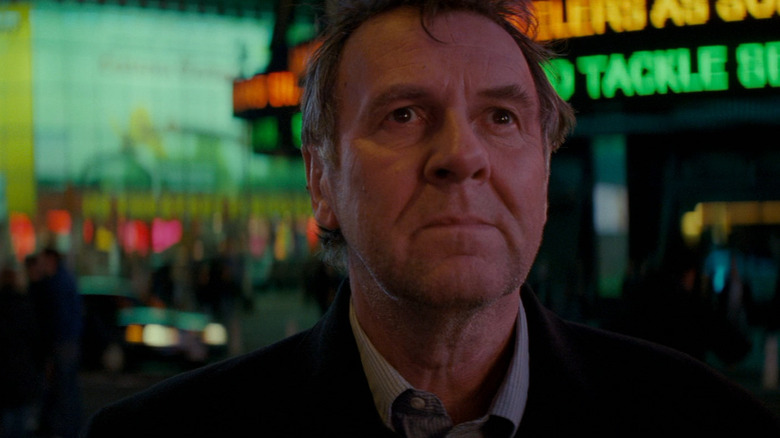George Clooney Starred In An Oscar-Winning Movie From The Creator Of Andor
The "Bourne" films might've put Tony Gilroy on the map, but his strengths as a screenwriter shine the brightest in "Rogue One: A Star Wars Story" (which he essentially saved from creative ruin). The brilliance of "Rogue One," however, was eclipsed when Gilroy dropped the first season of "Andor" in 2022. The Disney+ series rewired our expectations for the "Star Wars" franchise like nothing before it, all the while expanding upon established canon (as well as the Expanded Universe, aka Legends!) to enrich our perspective of the galaxy far, far away we know and love. Ultimately, Gilroy delivered two beautiful, hard-hitting seasons of the series, etching an unforgettable journey for Cassian Andor (Diego Luna) and the friends (and enemies) he made along the way.
Prior to the deserved success of "Andor," however, Gilroy also gave us the Oscar-winning "Michael Clayton," the 2007 George Clooney vehicle that takes a bristling, slow-burn approach to exposing the rot of corporate corruption. Right off the bat, it becomes clear that Clooney is the key to the film, as his slick, glamorous presence slots perfectly into the role he's asked to play. The actor stars as the titular Michael Clayton, a shrewd, no-nonsense fixer who never loses sight of the facts and keeps his feet planted firmly in the realm of pragmatism, even when the truth becomes a bit unsavory. When he suddenly has to deal with a rogue case concerning an attorney having a breakdown during a deposition, it sets a deadly chain of events in motion, along with Clayton's own odyssey of shifting ethics and allegiances.
Yes, "Michael Clayton" has always been a critical darling, and Gilroy's character-driven thriller (which he both wrote and directed) continues to be showered with praise for its sharp, witty storytelling. That said, it's never a bad idea to scrutinize a beloved film through a fresh lens or examine why it still manages to impress us today. Does the story go beyond a standard critique of corporate hegemony, or is there more to Gilroy's filmmaking than meets the eye?
Gilroy's Michael Clayton is an uncompromising examination of conscience
After high-profile attorney Arthur Edens (Tom Wilkinson) undergoes a public breakdown in the middle of a deposition, the $3 billion dollar class action lawsuit he had been handling suddenly finds itself in jeopardy. Due to the personal nature of the crisis, Clayton must marginally soften his characteristic bluntness as a fixer and find a way to get Edens back on the right track.
What begins as just another task turns into an agonizing examination of personal morality/conscience. While Clayton is acutely aware of the superficial civility that masks the ugliness of the corporate world, isn't he also a part of that facade? After all, if the corporate machine is a giant superstructure, cogs like Michael Clayton are molded to serve it, even when that machine renders them helpless and strips them of any integrity that might be considered redeeming.
Clayton is acutely aware of this, which is why he understands that he must stoop to a certain level to best the game, thwarting deceit with deceit. But he isn't completely in control of his life, despite how level-headed he might appear: A risk-mitigator like Clayton must have a risk-laden impulse, and in this case, it is high-stakes gambling. Even when we're confronted with this aspect of his character, Gilroy doesn't linger, as this personal habit only starts to make more sense when contrasted against everything he's forced to do to survive at his law firm, Kenner, Bach, and Ledeen. This contrast is also depicted on a visual level, as cinematographer Robert Elswit ("Magnolia") uses the cold sterility of corporate offices to turn up the warmth of a home, no matter how imperfect or broken it may be.
Gilroy tends to handle characters on a root level, reaching into their foundational desires (and the ways these conflict with the often brutal reality of their lives) to write stories brimming with nuance. Cassian Andor is emblematic of this, as his evolution from aloof thief to impassioned Rebel (one who ardently believes that self-sacrifice is worth the cause) is as beautiful and complex as one could hope for. Cassian's arc bleeds into every other aspect of "Andor," which ends up retroactively improving "Rogue One" (despite it being a great film to begin with). In "Michael Clayton," the titular figure is granted a similar complexity, as his increasingly frenetic actions speak to the desperation with which he wants to do the right thing.
The short of it? If you're looking to fill the post-"Andor" void by watching a Gilroy-directed feature more rooted in real-world socio-politics, then "Michael Clayton" should help satisfy that itch.

